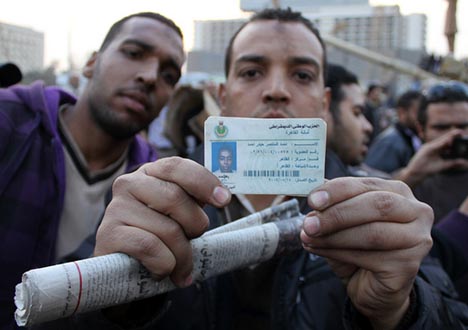From an Egyptian-Canadian student: “My mother, Mariam, is a medical doctor in Egypt. She was in Tahrir today — Thursday, Feb. 3 — treating people who had been wounded in yesterday’s vicious attacks. She wanted me to share this information with as many people as possible.”
Mariam’s account:
“Despite what happened yesterday, the mood in Tahrir is still uplifting and encouraging. These people were attacked yesterday by paid thugs bearing ‘white weapons’ (knives, daggers, swords). Against these attacks, they defended themselves with only their bare hands and literally the ground beneath their feet — pulling up the pavement to throw at their attackers.
[Ed. Note: the term ‘white weapons’ is likely a literal translation from from Arabic and refers to non-firearm weapons that can be used in a melee, including knives and batons.]
A lot of them took very serious injuries and they have lost a lot of blood. Yesterday, as another volunteer doctor was bringing medical supplies for the victims of the attack, she was threatened (including sexual threats) by the plain clothes police, and then they stopped her and confiscated the supplies.
These people [in Tahrir] are heroes, truly. They have been peaceful, and the young people who have been leading this movement continue to maintain the security of the city. They are still holding neighbourhood watches and directing traffic. The country is really being organized and managed by the youth, who are doing a much better job than the regime before them. They are replacing the functions of the regular police.
The people in Tahrir have been there for over a week and they are exhausted. They haven’t slept or washed. But people throughout the city continue to bring them food and water and other supplies. There is no cash now, cash flow has stopped, and Mubarak is using this to stall and try to deplete his enemy — which is the youth, essentially, the people of Egypt — of their resources. Omar Suleiman is doing that now, too, asking for 70 days to change the constitution. They are borrowing time from the Egyptian people.
Mubarak knows that he is under the eyes of the world, so he doesn’t use ‘explicit’ force — that is, the regular forces, or people in uniform. The U.S. has asked him many times not to do so, and he knows he would be seen as a criminal in the eyes of the world if he did so. He wants to hide this from the world, so he is using mercenaries and inmates. This is also why he has come down so hard against the journalists, especially Al Jazeera.
A lot of people expect the violence to get worse tomorrow, Friday, to a greater extent even than before. Mubarak has a crowd now prepared to fight for him, who have been trained and given weapons. So there has been a lot of prayer today. Heavens knows how those horses and camels got in. There are three big tanks guarding Tahrir and you have to file in and be screened to enter.
After the Friday prayers it’s expected that some of the mosques will have ‘pro-Mubarak’ people coming out of them, and others — many more — will have anti-Mubarak protesters. But the fear of violence is making some people afraid and some opposition parties have said they are discouraged to take part tomorrow. There may be hope if the army comes to the defence of the people.
Everyone in the country — everyone, deep down — knows that the government is lying to them. They don’t believe a thing either Mubarak or Suleiman are saying. But they are scared for their lives and for their families. They want to demonstrate tomorrow, but there is a lot to lose by expressing their opinions, and Mubarak is the cause of this fear.
The writer is a medical doctor who has been treating the wounded in Tahrir Square in Cairo. Her anonymity and that of her child, who forwarded this account to rabble.ca, has been assured to protect them.



